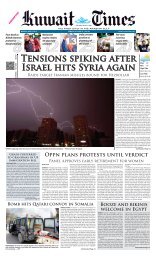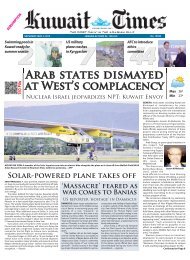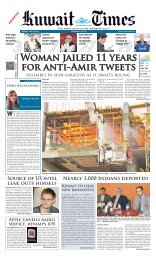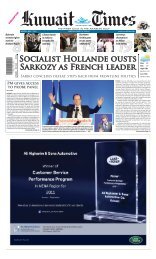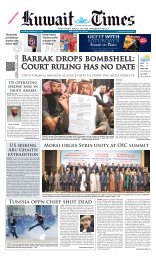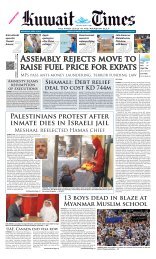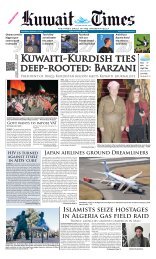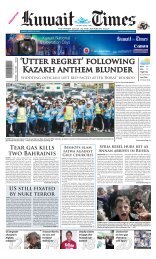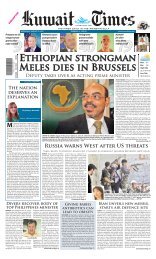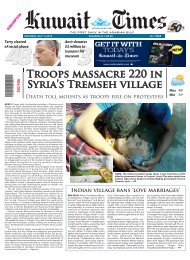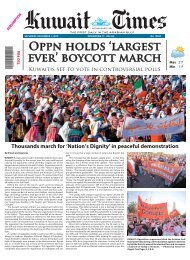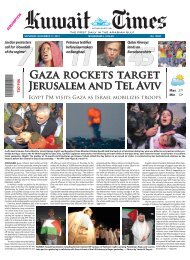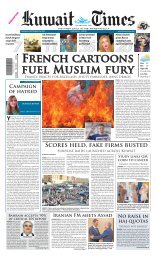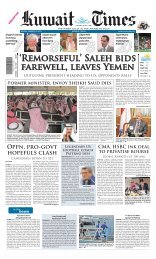NEw SARS-likE viRUS EMERGES iN MidEASt - Kuwait Times
NEw SARS-likE viRUS EMERGES iN MidEASt - Kuwait Times
NEw SARS-likE viRUS EMERGES iN MidEASt - Kuwait Times
Create successful ePaper yourself
Turn your PDF publications into a flip-book with our unique Google optimized e-Paper software.
G iven<br />
kuwait digest<br />
An Egyptian<br />
experience<br />
By Waleed Al-Rujaib<br />
During a recent visit to Cairo, I had a conversation<br />
with a friend which saw me expressing frustration<br />
from the extreme traffic problem at the<br />
Egyptian capital. The conversation dragged on as I<br />
expressed disappointment about how the Egypt that I<br />
know have changed so much, with cities filled with<br />
complex road networks and consumer lifestyle that<br />
adds to the suffering of the working class, while lacking<br />
libraries containing books of knowledge.<br />
I was comparing between Egypt today and Egypt<br />
during the time I lived there as a college student nearly<br />
40 years ago. After discussing the cultural and social<br />
changes in our countries, my friend suggested that I<br />
deliver a seminar to talk about <strong>Kuwait</strong> whose name is<br />
synonymous with culture and democracy in the Arab<br />
region.<br />
I was given the opportunity during the seminar to<br />
talk about the history of <strong>Kuwait</strong>’s economy, society<br />
and culture. I explained the difference between<br />
<strong>Kuwait</strong> today and during the sixties and the seventies<br />
of the past century, mentioning the social and cultural<br />
changes that affected daily behavior and values. I<br />
noticed that the majority of people attending the<br />
seminar were professionals or educated people, and I<br />
was shocked to realize that some of them still believe<br />
that <strong>Kuwait</strong> is an invented entity and historically is<br />
part of Iraq. I attempted to correct this misconception<br />
by asking for a proof to support this theory - which<br />
none was able to provide - while giving names of<br />
books with high cultural and historical credibility to<br />
back up my point.<br />
My attention was also caught by someone who<br />
used the term “democracy of Bedouins” during his<br />
speech. To be honest I wasn’t sure if he was trying to<br />
undermine <strong>Kuwait</strong>’s democratic experience with that<br />
term, or it was made with good intention. Meanwhile,<br />
another person argued that stating that demands for<br />
parliamentary work started in <strong>Kuwait</strong> since 1921 are<br />
exaggerated.<br />
The seminar also addressed the Arab Spring; on<br />
which one man in attendance argued that the revolutions<br />
are created by America in order to allow Islamists<br />
to reach power. And while admitting that martyrs<br />
have fallen during the January 25 Revolution, he<br />
insisted that the situation is different in Syria where he<br />
said that the revolution “aims to remove the resisting<br />
regime of Bashar Al-Asad by the hands of armed<br />
Jihadist groups”. I know this is only one man’s opinion,<br />
but I couldn’t help but feel disappointed that it would<br />
come from someone who claims to be educated.<br />
Midway through the seminar, a group of people<br />
came inside who according to the seminar’s supervisor<br />
are unionists that arrived late because they were<br />
taking part in a demonstration to demand rights that<br />
they believe President Mohammad Morsi’s administration<br />
is attempting to obliterate. I noticed that their<br />
comments were more mature and reflected more<br />
political awareness compared to opinions expressed<br />
by the educated attendees. They even praised<br />
<strong>Kuwait</strong>’s unionist work, and expressed high deal of<br />
knowledge about what’s going on in <strong>Kuwait</strong>, Syria as<br />
well as Egypt. Furthermore, they showed great level of<br />
enthusiasm while expressing faith that their revolution<br />
against the Muslim Brotherhoods’ rule will be victorious.<br />
This experience proved to me once again that<br />
workers are more aware, more eager and more optimistic<br />
than some educated people who still live in<br />
obscurity and despair. It also made me understand<br />
that these educated people never took part in the<br />
Tahrir Square demonstrations as part of the Egyptian<br />
revolution. — Al-Rai<br />
kuwait digest<br />
Protecting<br />
communities’<br />
identities<br />
By Dr. Mohammad Al-Moqatei<br />
the increasingly deliberate actions practiced<br />
by certain individuals and parties around the<br />
world to provoke Muslims by insulting Islam and<br />
the Prophet Muhammad (PBUH), I believe that the best<br />
way to face this is through the international legal system.<br />
Arab and Muslim governments are today required to act<br />
on top international forums, especially with the United<br />
Nations, in order to come up with an international treaty<br />
that protects identities of communities and religious<br />
beliefs and develop a treaty that classifies religious<br />
insults as an international crime for which violators can<br />
be brought to trial in local and international tribunals.<br />
Iconoclasm is a crime punishable by international law,<br />
even if it happens during times of war. I believe that protecting<br />
religious beliefs and identities of communities<br />
isn’t less important than protecting religious symbols.<br />
Some countries have laws that criminalize anti-Semitism<br />
or offending ruling figures. A recent example of that happened<br />
when the United Kingdom took efforts to stop<br />
publishing revealing pictures of Princess Kate Middleton,<br />
prompting several countries, including France, to issue<br />
orders against publishing them. In my opinion, protecting<br />
religious beliefs and cultural identities of societies is<br />
more important than that.<br />
That’s why I believe an international agreement to<br />
protect the religious and cultural identity of countries<br />
and communities is important. It would provide international<br />
protection that prevents violent reactions that otherwise<br />
happen as a result of a lack of criteria to stop<br />
offensive actions against religious beliefs. The treaty<br />
would further help take legal actions in a civilized manner<br />
that would prove to be effective in deterring insults<br />
so that no excuse will be left to justify people responding<br />
violently.<br />
Turkey and Egypt did the right thing by taking legal<br />
actions against the people who offended the Prophet<br />
Muhammad (PBUH). This is, indeed, the safest way to deal<br />
with this issue.—Al-Rai<br />
4 LOCAL<br />
Worst totalitarian regime<br />
W hat<br />
did transpire out of the regional changes in<br />
most of the Arab countries that we witnessed<br />
over the past year and a half, and have these<br />
legitimate uprisings resulted in chaos and instability?<br />
Maybe the most important result is the uncovering of<br />
the American-Persian (Iranian) partnership to divide the<br />
spoils, and reward the land of Persia (Iran) and present<br />
it with the price which includes Iraq, Bahrain, Syria, and<br />
Lebanon in exchange for Iran continuing its spreading<br />
of sectarian strife in the Arabian Gulf and Middle East.<br />
Iran, which America handed Iraq over to at the end<br />
of 2011, is protecting the most dangerous mission in<br />
the way of liberating Iraq and spreading sectarian<br />
chaos, stealing its natural resources, killing its scientists,<br />
and changing many of the moral, social, intellectual,<br />
and cultural characters of Arab societies by taking<br />
advantage of poverty, backwardness and discrimination.<br />
It also changed the traditional stability of the Arab<br />
Maghrib (North African) countries into major trouble<br />
where sectarian strife is playing an increasing role day<br />
after day.<br />
Persia, with all the factors of danger and animosity in<br />
it, must be brought back to size, not just having its nails<br />
clipped. Our battle as Arabs with Persians is a battle of<br />
existence and identity and freedom of generations, not<br />
just a battle of borders, because Persia, which was overwhelmed<br />
with the feelings of victory when it isolated<br />
Iraq, then destroyed it, developed an appetite for<br />
expansionism and the wish to control, and always wave<br />
its military nuclear project to support its extortion<br />
capabilities, both locally and internationally. So, is it<br />
enough to only clip Iran’s nails and will the true rescue<br />
of our nation from its catastrophes that were caused by<br />
the Persian danger and influence be fulfilled that way?<br />
The rescue of the Arab nation from Iranian arrogance<br />
will not be achieved, and the fiercest and most<br />
dangerous Iranian attack on Arabs will only be stopped<br />
by removing Persia’s claws and its cronies in the Arab<br />
and Gulf countries and the enemy Trojan horses that<br />
are waiting for the Iranian orders to jump all over us in<br />
non-stop operations as long as Iran remains able to<br />
cause deep wounds with its claws. So how will we<br />
remove the Persian claws to guarantee its inability to<br />
kuwait digest<br />
By Abdallah Al-Hadlaq<br />
hurt the Arab nation for many centuries, and maybe<br />
forever? The decisive and frank answer is that victory<br />
should start in Iraq by kicking Persia out, and that can<br />
be achieved by the Arab Iraqi resistance and its Sunni<br />
Kurds in Iraq’s Kurdistan, and then we move to the other<br />
choice, which is the destruction of one or more of<br />
Iran’s centers outside Iraq in Lebanon, Syria,<br />
Afghanistan, Gaza, West Bank, Bahrain, Qateef and others.<br />
If the Persian presence in Iraq is dealt a severe blow<br />
that weakens the morale of its traitors, and coincides<br />
with targeting its military and political centers outside<br />
Iraq, then Persia will not be able to fight two major battles<br />
at the same time, and in both cases the spearhead<br />
will be the Iraqi resistance with all its Arab, Kurd,<br />
Assyrian and Kaldonian factions.<br />
Launching an all-out war on the Persian influence<br />
centers in Iraq, Bahrain, Qateef, Lebanon, Syria, Gaza<br />
and Yemen is the goal of the Arab National liberation<br />
movements, and their basic mission is to abort the<br />
Persian plan that is trying to uproot the Arab identity of<br />
Iraq and other Arab countries, especially now that<br />
Persia announced that the Emirati islands are forever<br />
Persian, Bahrain a Persian province and that the Arabian<br />
Gulf is also Persian! And that Persia is in control of the<br />
Arabian Gulf region.<br />
In the latest report by the International Atomic<br />
Energy Agency (August 30, 2011) it was proven that<br />
the activities of Persia to enrich uranium did not stop<br />
but, rather, was accelerated in the Fordo and Parsheen<br />
facilities and that the quantity of enriched uranium<br />
increased from 145kg to 255kg, an increase of more<br />
than 75%, and diplomatic efforts that took place in<br />
April 2012 failed due to Iran’s continued stubbornness.<br />
Efforts by the council of the IAEA on December 9, 2012<br />
also failed because of Iran’s stubbornness and they<br />
must again bring Iran before the Security Council.<br />
Whoever calls for including Persia in the talks to<br />
solve the Syrian problem is mistaken because Iran is<br />
part of the problem, not the solution, and because the<br />
fascist Zuradishti ruling regime in Tehran is the worst<br />
totalitarian regime in the world and supports the<br />
criminal Bashar Al-Asad in his annihilation of the<br />
Syrian people.<br />
Creating crises for political mileage<br />
D ear<br />
Sirs, <strong>Kuwait</strong> as a country still has to figure out the<br />
basic tenets of politics, which is evident in the way<br />
our national political arena has been functioning,<br />
which is probably one of the worst in the world. The lack of<br />
understanding that is rampant in our political work has<br />
resulted in many crisis and disasters, until we established a<br />
monopoly on them. Contrary to our sorry state of affairs,<br />
our neighboring countries, who are living under similar circumstances,<br />
but do not share<br />
our political beliefs have progressed<br />
way ahead of us, leaving<br />
behind a gap of at least four<br />
decades. This has happened<br />
despite the fact that till a few<br />
years back, these countries were<br />
lagging behind <strong>Kuwait</strong>. Do you<br />
feel that things have changed in<br />
our country? May be you are<br />
wrong?<br />
My dear, democracy is also<br />
about harboring a deep belief in<br />
opinions, but more importantly<br />
another person’s opinions.<br />
Another person’s opinion could<br />
be wrong but possibly right as<br />
well, and your opinion could be<br />
right, but possibly wrong too.<br />
Democracy is not about your<br />
personal opinions always being<br />
right and never wrong and considering<br />
others’ opinions always wrong and never right.<br />
Real democracy is also a state, where even though your<br />
opinion might differ from someone else’s you are still willing<br />
to pay the price for following that other person’s opinion,<br />
even if it means sacrificing your life.<br />
Politics, my dear, is the art of making the impossible<br />
possible. But <strong>Kuwait</strong>i politics has unfortunately transformed<br />
into something where politics mainly involves formulating<br />
political policies that either allow you to forgive<br />
and forget or are based on hatred and doubt, or defaming<br />
your opponents, even though they might be right and<br />
sometimes even if you are wrong.<br />
In the right kind of politics,<br />
there are no permanent enemies<br />
or friends. But in our case,<br />
our lawmakers are constantly<br />
bearing out their permanent<br />
enmities in public and on the<br />
way making new enemies.<br />
While in advanced countries,<br />
politics has been able to replace<br />
street-level discourses with<br />
advanced and parliamentary<br />
dialogue, the exact opposite has<br />
happened in <strong>Kuwait</strong>.<br />
kuwait digest<br />
By Sami Al Nisf<br />
Politics is a normally like a game which delights the<br />
audience because of its unpredictability. But in <strong>Kuwait</strong>, this<br />
game is already fixed in advance, and is run from beyond<br />
the playgrounds, is pre-planned in such a way that audience<br />
or rather the <strong>Kuwait</strong>i public are made to cry and are<br />
deserted in a way, which makes us a laughing stock in the<br />
eyes of our neighbors. As a result of our politicians practicing<br />
this particular brand of politics, we are always in the<br />
midst of some crisis or the oth-<br />
er, which is more often than not<br />
created to gain political<br />
mileage. Politicians feel proud<br />
to make every dramatic declaration<br />
they can about ending<br />
the crisis, which in turn creates<br />
a new one. But who decided<br />
that politics cannot be practiced<br />
without creating a crisis<br />
rather than solving it?<br />
In the right kind of politics,<br />
there are no permanent enemies<br />
or friends. But in our case,<br />
our lawmakers are constantly<br />
bearing out their permanent<br />
enmities in public and on the<br />
way making new enemies.<br />
While in advanced countries,<br />
politics has been able to<br />
replace street-level discourses<br />
with advanced and parliamentary<br />
dialogue, the exact opposite has happened in <strong>Kuwait</strong>.<br />
We discuss something as serious as amending the constitution<br />
with the frivolity of a street dialogue and legislate our<br />
laws without giving them due consideration. So please<br />
explain to me as to which political dictionary has helped<br />
you in developing your deductive powers.<br />
Note: How can a man who cuts his nose or gouges his<br />
eyes out to make his wife angry be considered wise? At the<br />
same time, where is the wisdom in threatening to rally on<br />
streets and spreading confusion against a matter that does<br />
not hurt the country or pose any threat to the common<br />
man? —Al-Anbaa<br />
TUESDAY, SEPTEMBER 25, 2012<br />
Controversial<br />
Thoughts<br />
“I<br />
Addressing<br />
unemployment<br />
H uman<br />
in my view<br />
By Alia Al-Hazeimi<br />
love you when you bow in your mosque, kneel in<br />
your temple, pray in your church. For you and I are<br />
sons of one religion, and it is the spirit.” Khalil<br />
Gibran.<br />
It took me two hours of thinking after reading this<br />
quote, thoughts regarding God, religion and current<br />
events that are shaping the world we live in today. I<br />
found these elements are quite challenging, although<br />
they seem as our motives for doing goodness and<br />
spreading kindness in the world. Unfortunately the<br />
opposite is happening more often, many of these elements<br />
are being shaped into other “forms” or to be more<br />
specific, tools.<br />
Throughout centuries, religion and politics walked<br />
hand- in- hand and seemed to be inseparable, although<br />
there were many attempts to prove otherwise. But these<br />
attempts were caught between a rock and a hard place.<br />
In simple English, the definition of “religion” is ‘a set of<br />
beliefs concerning the cause, nature, and purpose of the<br />
universe, especially when considered as the creation of a<br />
superhuman agency or agencies, usually involving devotional<br />
and ritual observances, and often containing a<br />
moral code governing the conduct of human affairs.’<br />
And politics is ‘The activities associated with the governance<br />
of a country or area and the total complex of<br />
relations between people living in society’.<br />
If we blind fold these two terms, we would probably<br />
think they are both the same, they both aim to govern<br />
human affairs. The question that keeps crossing my mind<br />
is “was religion really a constitution? Therefore religious<br />
scriptures are politics?” and if it is yes then genocides and<br />
waging wars in the name of God is man-made?<br />
Let’s forget about ancient history and take the crusades<br />
and on wards as examples. Weren’t all these campaigns<br />
made under the banner of “God Wills It?” How<br />
many recent wars and carnages were made against people<br />
due to differences of beliefs? Yet at the end of the day<br />
all these events are documented and observed by political<br />
entities!<br />
Religion has a sanctified holy nature that is not “supposed”<br />
to be manipulated for achieving personal gains<br />
and most importantly should not be used to justify acts<br />
of violence. No religion in this world allows bloodshed<br />
and promotes war, and even if there is, it is what is<br />
known as acts of “retaliation”. However, is it really retaliation<br />
when all these conflicts are taking place in countries<br />
and parts of the world that know so little about anyone’s<br />
else religion.<br />
Is it a lack of knowledge that led to “retaliation-like”<br />
conflicts? Or could it be that high authorities internationally<br />
did not take the time to understand other religions<br />
and show mutual respect? Isn’t respect the most basic<br />
code after believing in God in all religions?<br />
Have we forgotten that “Peace” is a common ground<br />
for all religions and that we’re here to do good? Aren’t we<br />
obliged to respect each other’s religions without any kind<br />
of racism and hate? Aren’t we supposed to suppress all<br />
forms of aggression? After all, we are all human.<br />
Don’t you agree?<br />
kuwait digest<br />
By Riyadh Al-Adasani<br />
development is crucial for a nation’s development<br />
and advancement. Governments were<br />
put in place for the people, not the other way<br />
around. The government’s role is to take care of its citizens<br />
and to improve services. Our government, however,<br />
lacks vision and a workable plan for the future. It has certainly<br />
failed to give importance to developing the country’s<br />
most precious wealth, which are its human<br />
resources.<br />
Where is the government’s plan to tackle unemployment?<br />
The number of unemployed citizens in <strong>Kuwait</strong> has<br />
reached nearly 20,000 and continues to increase annually.<br />
In the meantime, the national labor law, which directs<br />
that 60 percent of staff members at banks and major<br />
companies must be <strong>Kuwait</strong>is, has not been effectively<br />
enforced. The government should’ve forced these firms<br />
to abide by the law before offering them with a multibillion<br />
stimulus package during the financial crisis.<br />
The government must have a clear vision that focuses<br />
on supporting its young citizens and building their<br />
future, because they make up 50 percent of our population<br />
today, and are the country’s future. Currently, there’s<br />
huge demand for state jobs, which is threatening the<br />
state’s budget and is expected to boost inflation, since<br />
<strong>Kuwait</strong>’s economy is completely dependent on oil prices.<br />
This situation has left <strong>Kuwait</strong>i youth facing a dark future,<br />
who have to sometimes wait for as long as two years<br />
before finding a job, while expatriates - with all due<br />
respect - have a job waiting for them even before they<br />
have left their home country.<br />
Being close to young citizens, I can see how they suffer<br />
on account of the government’s policies, especially<br />
those of the <strong>Kuwait</strong> Municipality, the Ministry of<br />
Commerce and the Ministry of Social Affairs and Labor.<br />
Their hopes for starting their own businesses fade away<br />
as a result of the government’s own crippling demands.<br />
Even the ‘e-government’ project is a mere slogan and far<br />
removed from the ground reality.<br />
In order to address the unemployment problem, the<br />
government must improve the private sector in order to<br />
provide job opportunities for <strong>Kuwait</strong>is. It should also<br />
enforce early retirement and create new jobs. The government<br />
must also allow young citizens to own industrial<br />
land and start businesses in the economic, handicraft,<br />
commercial and other fields. There’s no reason why the<br />
government cannot expand the current industrial land<br />
usage, because nearly 93 percent of <strong>Kuwait</strong>’s land area<br />
remains unutilized.<br />
Land monopolies tend to kill the ambitions of young<br />
citizens and they need the government’s support for<br />
their projects and for ensuring that all their work-related<br />
procedures are facilitated. This essential support will help<br />
young citizens on the one hand and benefit the state on<br />
the other. —- Al-Qabas



